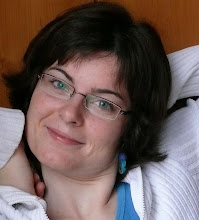 On Thursday we went to our first school visits. Me and Mate went to a 10th grade school in . We were warmly welcome by Annette and all teachers in the teacher´s room. First of all we got a cup of coffee and Annette introduced us more to the Danish school system and 10th grade schools. This kind of schools is very interesting for me, because we don´t have any in my country. Students who finish 9th grade have an opportunity to attend an additional year. It gives them chance to:
On Thursday we went to our first school visits. Me and Mate went to a 10th grade school in . We were warmly welcome by Annette and all teachers in the teacher´s room. First of all we got a cup of coffee and Annette introduced us more to the Danish school system and 10th grade schools. This kind of schools is very interesting for me, because we don´t have any in my country. Students who finish 9th grade have an opportunity to attend an additional year. It gives them chance to:- get to know themselves more - and help to find them their way in professional life - the following studies, job suitable for them, if the aren´t decided yet
- gain more knowledge for following studies - they can focus more on field of study they need for their high school (for example grammar school)
- mature more before such an significant life decision about their future career (and enjoy teenage life of course)
There are also quite lot emigrant-pupils, who have an opportunity to catch up with the other pupils during the additional year (they had a disadvantage because of language difficulties in their first years of studies).
These 10th grades schools are therefore optional, Danish teenagers can go there - or continue directly at high school after 9th grade.
As Annette said us Danish pupils can go after finished 9th grade to:- A 10th grade school - an additional year
- Upper secondary schools - Technical
- Business
3. Apprenticeship -technical/business etc. ......Then we had a bit more time, so we spoke to other teachers in the teacher´s room and after our first lessons experience was to come. Me and Mate visited together the English lesson with Annette and then Mate observed a math lesson and me another English lesson with a different teacher.
Firstly I would like to tell you THE DIFFERENCIES
(because you notice differencies at first, of course):
-therefore Annette could use Youtube during the lesson
(on the other hand, the classrooms weren´t too decorated - with posters, pictures, useful materials and charts, students´projects, etc. - as Czech language classrooms usually are)
- the could wear caps, have a lollipop, have their laptops on...

- this is maybe because of that kind of school, I think that 10th grade schools differ a bit from the other schools, but I haven´t had an opportunity to compare yet. I will see...
- the relationship between teacher and pupils is different, I would call it more a "partnership"
- the teachers behave more friendly towards students (especially the second one), they didn´t show any superiority
- I think there was more understanding between teachers and pupils, it was more personal (some pupils spoke to the teacher in the corridor spontaneously, that is VERY rare in the Czech Republic)
- the teaching is less frontal, the pupils worked more in pairs, groups, individually
- their are simply -used to it. In Czech schools is rather unusual for them, because most subject are taught frontally, I think they feel a bit uncomfortable about group work and responsibility then
- the teaching is less content-driven and more objective- and process-driven
- pupils are more involved in the lesson
- the teacher is more guide than "the only source of information" (using the internet in the lesson is also connected with less "information-passing" role of the teacher and more showing the way where to find the information and how to deal with it)
- the school is more connected to real life
(-the teacher for example discused different topics from the book with pupils, they have to think about reasons and solutions of violence in the streets)
- the teachers co-operate a lot to prepare the plans for the subject they teach
- they can substitute each other easily then if one of them is ill
- the teachers seemed to be more relaxed and less stressed than Czech teachers, they seemed to have more understanding for students, involve more effort for preparing materials, like their job

AND WHAT IS SIMILAR?
- organization of the classrooms (desks in lines)
- classroom environment
- condition of the building
- pupils´ behaviour (not excellent, not bad, but still depends on a teacher a lot, of course)
SOME WORDS IN THE END...

The Danish schools reminds me our Czech new system called "Framework educational programme" (it has been introduced since September 2007 to first classes) - in established practice.
It is really valuable experience for me.
I really liked the second lesson, the teacher has really good relationship with students and the lesson, the teaching process seemed to be joy for both sides.



No comments:
Post a Comment